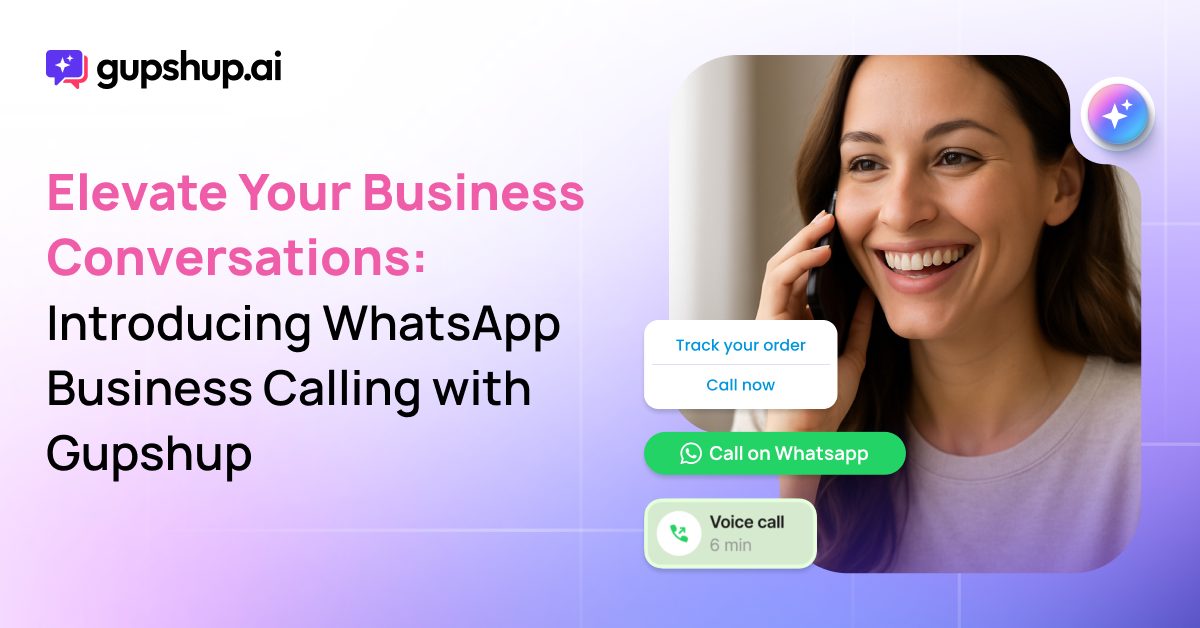Elevate Your Business Conversations: Introducing WhatsApp Business Calling with Gupshup

- Introduction
- Why WhatsApp Business Calling? The Gupshup Value Proposition
- Understanding How to Leverage WhatsApp Business Calling
- Use Cases: Where WhatsApp Business Calling Shines
- Looking Ahead: The Future is Conversational
See the power of intelligent conversations for your brand.
Introduction
In today’s fast-paced digital world, connecting with your customers isn’t just about sending messages; it’s about fostering meaningful conversations. While WhatsApp has long been the preferred platform for billions to communicate, its evolution for businesses has been nothing short of transformative. At Gupshup, we’re thrilled to highlight a game-changer for your customer engagement strategy: WhatsApp Business Calling. This feature is designed to bridge the gap between quick chats and real-time, voice-to-voice interaction, making your customer service more personal and efficient than ever before.
Why WhatsApp Business Calling? The Gupshup Value Proposition
The modern customer expects instant, convenient, and personal communication. Email can feel slow, and traditional phone calls often come with long hold times and frustrating IVR menus. WhatsApp Business Calling addresses these pain points directly.
1. Unparalleled Accessibility and Convenience
WhatsApp has become a global hub with more than 2 billion active users, making it the go-to platform where your customers are already engaging every day. This seamless experience significantly reduces friction in customer interactions.
2. Enhanced Customer Engagement and Trust
Voice calls add a human touch that text alone sometimes can’t convey. It allows for real-time problem-solving, nuanced discussions and a more personal connection. When a customer hears a friendly voice from your business, it builds trust and loyalty. It shows that your business is accessible and values direct communication.
3. Cost-Effective Communication
WhatsApp calls leverage internet connectivity, making them a cost-effective alternative to traditional international or even local calls, especially for businesses with a global customer base. As a result, businesses can cut down considerably on telecom expenses.
4. Seamless Integration with Existing WhatsApp Business APIs
Integrating voice calls is a natural next step for businesses that already use Gupshup’s WhatsApp Business API. With both WhatsApp voice calling, your communication channels chat, notifications, and now calls are all consolidated within a single, familiar ecosystem. This simplifies your agents’ workflows and gives them a unified view of all customer interactions.
5. Rich Context for Human Agents
Imagine a human agent answering a call with the full chat history and customer profile immediately available. This rich context, facilitated by Gupshup’s platform, allows agents to understand customer needs faster, provide more relevant solutions, and deliver a superior service experience. No more repeating information; just efficient, informed assistance.
6. Global Reach, Local Feel
Whether your customer is in Virar, Maharashtra, or São Paulo, Brazil, WhatsApp Business Calling allows you to connect with them instantly, often making the interaction feel local and personal, regardless of geographical distance. This is crucial for businesses aiming for international expansion or serving a diverse customer base.
Understanding How to Leverage WhatsApp Business Calling
Adopting new technology requires understanding how to maximize its potential. Gupshup is committed to educating businesses on best practices for WhatsApp Business Calling.
A. Setting Up Your Business for Calling
1. API Integration with Gupshup:
The foundation of WhatsApp Business Calling lies in having a robust WhatsApp Business API integration. Gupshup provides an easy-to-use platform that simplifies this process. If you’re already with us, you’re halfway there! We ensure your setup meets WhatsApp’s guidelines for secure and reliable communication.
2. Enabling Calling Features:
Once integrated, enabling calling is straightforward. Our documentation and support team will guide you through activating the voice and video call capabilities for your business profile. This typically involves configuring your API settings to allow for incoming and outgoing calls.
3. Agent Training and Workflow:
- This is crucial. Your customer service team needs to be trained not just on how to use the calling feature, but also on best practices for voice communication within a business context. This includes:
- Professionalism: Maintaining a courteous and helpful tone.
- Active Listening: Ensuring customer concerns are fully understood.
- Leveraging Chat History: Using available chat context to personalize calls.
- Voice AI and IVR Routing Pointer for Business Calling : The primary function of this feature is to intelligently route callers to the most appropriate system either a traditional Interactive Voice Response (IVR) or a Voice AI solution: Based on the query, customers may be guided via IVR or a more advanced Voice AI solution.
- Post-Call Follow-up: Documenting call summaries and scheduling follow-ups within your CRM.
B. Best Practices for Optimal Engagement
1. Offer Calling as an Option, Not a Requirement:
While powerful, calling should complement your existing chat services. Give customers the choice to call if their query is complex or urgent, or to continue chatting if they prefer text. This empowers the customer and caters to diverse communication preferences.
2. Clear Call-to-Actions (CTAs):
Make it easy for customers to initiate a call. This could be a “Call Us” button within your WhatsApp chat, an option in an automated menu, or a direct link on your website that launches a WhatsApp call.
3. Availability and Expectations:
Clearly communicate your call availability hours. If calls are only available during business hours use voice AI to handle customer calls, even outside your regular working hours. This allows you to serve customers 24/7 without needing a human agent, ensuring this is known to avoid customer frustration.
4. Record and Analyze (with Consent):
Just like traditional calls, recording WhatsApp Business Calls (with explicit customer consent where required by law) can be invaluable for quality assurance, agent training, and dispute resolution. Gupshup can help you integrate with tools that facilitate this. Analyzing call data can provide insights into common customer issues and agent performance.
5. Integrate with CRM and Helpdesk Systems:
For a truly seamless experience, ensure your WhatsApp Business Calling solution is integrated with your Customer Relationship Management (CRM) and helpdesk systems. This allows for:
- Automatic logging of call interactions
- Centralized customer data
- Improved case management and follow-up
- Personalized customer experiences based on past interactions.
Use Cases: Where WhatsApp Business Calling Shines
Let’s explore practical scenarios where this feature can revolutionize your customer interactions:
1. Customer Support and Troubleshooting
For complex technical issues, detailed product inquiries, or sensitive service complaints, a quick call can resolve issues far more effectively than a lengthy chat. Example: A customer struggling to set up a new smart device can receive real-time, step-by-step guidance over a call, potentially sharing their screen if video calling is enabled for more advanced support.
2. Sales Consultations and Lead Qualification
Businesses can use WhatsApp calls to conduct initial sales consultations, answer product questions, or qualify leads. It allows for a more personal sales approach, building rapport and trust. Example: A real estate agent can have a quick call with a prospective buyer to understand their preferences before scheduling a physical viewing, all initiated from their WhatsApp chat.
3. Appointment Scheduling and Reminders
While chatbots can schedule appointments, a quick call can be useful for confirming details, answering specific questions, or handling complex rescheduling requests. Example: A doctor’s office can call a patient to confirm an upcoming appointment, provide pre-appointment instructions, or address any concerns the patient might have.
4. Delivery and Logistics Updates
For urgent delivery issues, address clarifications, or last-mile coordination, a direct call to the customer or delivery agent can prevent delays and improve customer satisfaction. Example: A food delivery service can call a customer directly if there’s an issue finding their address, ensuring timely delivery and a positive experience.
5. Financial Services and Account Management
Banks and financial institutions can leverage secure WhatsApp calls for identity verification, discussing loan applications, or providing personalized financial advice (while adhering to strict security protocols). Example: A bank representative can call a client to clarify details on a loan application, offering a more secure and personal interaction than email.
6. Commercial Real Estate(Voice AI for Lead Generation)
A commercial real estate firm specializes in helping businesses find office spaces. They receive a high volume of inbound calls from potential clients who have seen a property listing or a digital advertisement. Example The Voice AI is integrated with the firm’s CRM. It scores the lead based on the answers and identifies high-value prospects (e.g., a company with a high budget, immediate need, and specific requirements). The AI also captures and logs all the information, creating a new lead record in the CRM.
7. Automobile Maintenance Appointment Booking(Automated):
Manual appointment booking for services like maintenance and repairs is a significant pain point for both customers and dealerships. Automated appointment booking, powered by AI and smart technology, is the solution. Example A customer’s car, a new model with connected vehicle features, records that it has reached 5,000 miles. At the same time, the car’s on-board diagnostic system detects that the tire pressure is consistently low in one tire and sends an alert to the dealership’s system. The system pulls the customer’s information from the Customer Relationship Management (CRM) system, noting their preferred communication method The system then sends a personalized text message to the customer. The customer, who was likely unaware of the low tire pressure, can click the link and in a few seconds, see real-time availability for the service bay. The customer chooses an available time, confirms the booking, and receives an instant confirmation. The system also sends a follow-up reminder the day before the appointment.
Looking Ahead: The Future is Conversational
At Gupshup, we believe that the future of business communication is deeply conversational, human-centric, and seamlessly integrated. WhatsApp Business Calling is a significant step in this direction. It’s not just about adding another feature; it’s about empowering your business to:
- Build stronger customer relationships
- Resolve issues faster and more efficiently
- Personalize every interaction
- Stay ahead in a competitive market
By leveraging the power of WhatsApp Business Calling with Gupshup, you’re not just communicating; you’re connecting, engaging, and ultimately, growing your business.
Read: Amplifying Marketing Strategies for Retail and E-commerce Brands with Gen AI-Powered WhatsApp Conversations




 +91-9355000192
+91-9355000192 Login
Login




